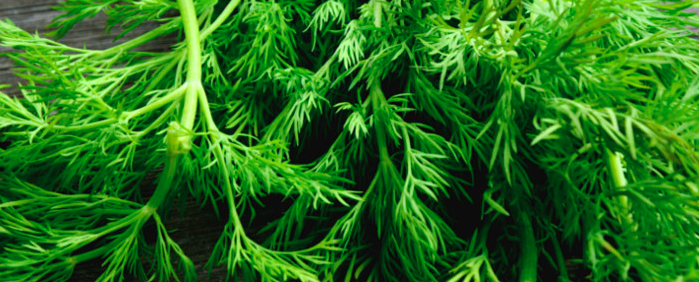
Dill for stomach aches
Dill is native to the Mediterranean basin and western Asia. It has been consumed since ancient times because it is mentioned in the Bible and Egyptian writings. Depending on the location, this plant was sometimes used to relieve stomach aches and flatulence, sometimes as a charm against bad spells.
Features of dill:
- Source of antioxidants;
- Source of vitamin C;
- Source of potassium;
- Diuretic;
- Improves digestion.
What is dill?
Dill ID card
- Type: Herbal;
- Family: Apiaceae;
- Origin: Mediterranean basin and Asia;
- Season: June to September;
- Green color ;
- Flavor: Aniseed.
Features of dill
When harvested, dill is up to a meter tall. It is green in color and its leaves are twig-shaped.
Word from the nutritionist
Herbs are usually not consumed in large quantities. Used as seasonings, they cannot therefore provide all the health benefits attributed to them. However, adding herbs to food on a regular and significant basis makes it possible to contribute, if only in a minimal way, to the antioxidant intake of the diet. On the other hand, consumption of herbs alone cannot meet the body’s antioxidant needs.
Nutritional values
For 100g of fresh dill:
| Nutrients | Quantities |
| Protein | 3.46 g |
| Fat | 1.12 g |
| Carbohydrates | 4.92 g |
| Water | 85.95 g |
| Fibers | 2.1g |
| Vitamin C | 85 mg |
| Beta carotene | 4632 µg |
| Calcium | 208 mg |
| Potassium | 738 mg |
| Iron | 6.59 mg |
| Magnesium | 55 mg |
4 benefits of dill: why eat it?
- Dill has anti-spasmodic properties. It helps fight hiccups and vomiting.
- It has digestive and stimulating properties that will improve digestion, stimulate transit and limit bloating.
- Thanks to its high potassium content, dill is a powerful diuretic.
- The essential oil it contains gives it sedative properties and makes it a natural calming agent.
How to choose your dill
When you buy it in a bouquet or a tray, the dill should have a bright green color.
Keep well
The fresh dill is kept for 2 days in the refrigerator by placing the stems in a bowl of water or by wrapping them in moistened absorbent paper.
The dried dill seeds are kept in an airtight container in a cool and dry place.
Dill preparation
How to cook it? How to match it?
Dill is used to flavor dishes and goes well with tomatoes, beets, celeriac, cucumbers, cabbage, cream, cream cheese, white sauces, eggs, salad dressings and seafood. Since fresh dill has a very light taste, it should be added at the very end of cooking.
Dill seeds are added to soups, cold sauces and salads. They go very well with fish marinades (especially salmon and herring).
Allergies
People allergic to plants in the carrot family like celery, coriander and fennel may have a reaction when consuming dill.
History of dill
Its name comes from the ancient Greek dill and means “which grows quickly”. Its aromatic and digestive properties were already well known to the Egyptians and the Ancient Greeks who also used it for its antispasmodic and sedative properties. The Romans decorated the banquet halls with blooming dill. In the Middle Ages, a small bag of dill was worn on the chest to protect against witches and the evil eye. However, around the world, it has mainly been used for its digestive properties.
In addition to the culinary uses that we know, this plant has been part of many traditional digestive and fortifying medicinal preparations that still exist today, especially in France, Italy, Germany and England. Its digestive properties are also recognized in Ayurvedic medicine (traditional medicine of India). In Eastern Europe and the Slavic countries, dill has been widely used in marinades to prevent the spread of bacteria in processed foods. The dill pickle remains a classic in this regard.
For further
At your fingertips in the garden
In season, the fresh leaves contain a good proportion of essential oil, but they quickly lose their properties on drying. Fresh dill is generally used in cooking for its carminative (which promotes the expulsion of intestinal gas) and digestive (very useful, especially to facilitate the digestion of cucumbers, pickles and legumes) properties.
Dill seeds, harvested when fully ripe and properly dried, retain their essential oil and the active ingredients they contain. They can be chewed as they are or crushed lightly to make an infusion.